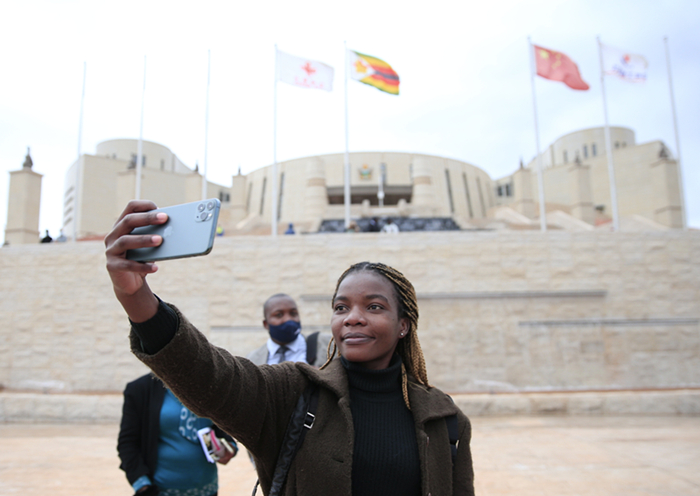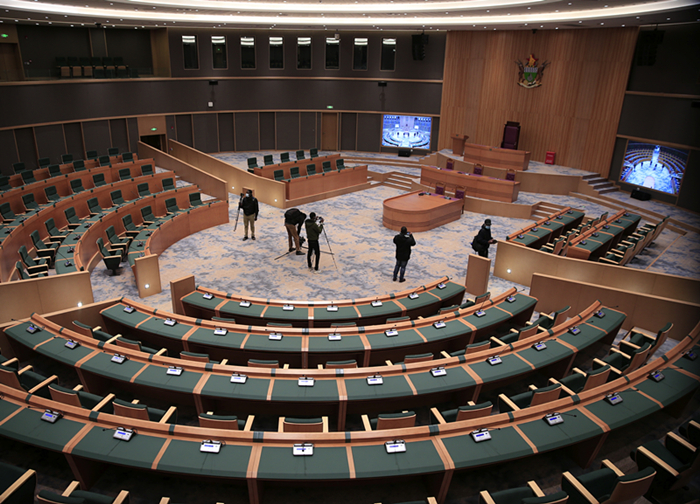|
||||||||||
| Home Nation World Business Opinion Lifestyle ChinAfrica Multimedia Columnists Documents Special Reports |
|
||||||||||
| Home Nation World Business Opinion Lifestyle ChinAfrica Multimedia Columnists Documents Special Reports |
| ChinAfrica |
| Unique Parliament Building on the Hill |
| Construction of a new parliament building illustrates the long-standing Zimbabwe-China relationship |
| Reporting from Zimbabwe Problem Masau 丨VOL. 14 August 2022 ·2022-08-17 |

A woman takes a selfie before Zimbabwe’s new parliament building on Mount Hampden Hill, Zimbabwe, on June 29, 2022
In 2019, whilst on a tour of the site allocated to building a new parliament for Zimbabwe, President Emmerson Mnangagwa said the edifice will be one of the most unique parliaments in the region.
“Besides being unique, it’s demonstrative of our comprehensive, strategic relationship with the People’s Republic of China,” he said at the time.
Three years later, in June this year, Former Zimbabwean Ambassador to China Christopher Mutsvangwa beamed with joy as he looked at an imposing architectural masterpiece - the new Zimbabwean Parliament has been completed on the elevated terrain of Mount Hampden Hill, just 30 km from Harare’s central business district.
“This is a culmination of long-standing Sino-Zimbabwean relations. It shows how the Asian giant has been our all-weather friend since the times of the liberation struggle. The West imposed sanctions on us, but with the help of China, we have been able to bust them,” said Mutsvangwa.
For years, Zimbabwean legislators had to sit in a cramped parliament, inherited from the colonial era and rented from the Anglican Church. Initially, the parliament was meant to accommodate less than 100 colonial parliamentarians; but with the country’s population growing over the years, the constituencies have grown to 210 in the lower house.
Landmark site
The new parliament building, which sits on a natural landmark 70 meters higher than the surrounding area, has a magnificent panoramic view of the surroundings.
Addressing journalists during a familiarization tour of the new parliament building, the contractor Shanghai Construction Group’s Manager Cai Libo said, “Zimbabwe’s new parliament building is one of the most important projects in China-Africa cooperation, which is aimed at strengthening solidarity between the peoples of Zimbabwe and China, while improving facilities in parliament to ensure better services to Zimbabweans at large. The project strongly supports democracy in Zimbabwe, while boosting the country’s image.”
Chinese Ambassador to Zimbabwe Guo Shaochun added that the new parliament building is further evidence to refute groundless accusations from some quarters stating that Zimbabwe didn’t benefit from its ties with China.
The building consists of common areas, offices, special services, general public and press areas, parking space and associated services.
Funded by the Chinese Government, the building’s National Assembly now has a capacity of 400 seats to accommodate members of parliament, while the Senate Chamber has a capacity of 150 seats. It features two main sections - a six-story office building and a four-story parliament building, which connect via three bridges on each floor.
Extra facilities for conferencing, 15 committee rooms and adequate space for office staff and parking are also included, while the office building contains 600 rooms, including offices for VIPs, members of parliament and parliament officials. In total, the building has the capacity to accommodate 1,000 people.
Cai said although the building project had commenced in November 2018 and was scheduled to be completed last year, it took longer than planned because of the interruptions due to the worldwide COVID-19 pandemic.
He said the building is landmark site in the Southern African region, as well as being a major milestone for China-Zimbabwe friendship, which stands to go from strength to strength under the strong leadership of Chinese President Xi Jinping and Zimbabwean President Mnangagwa.
New city around parliament

A view of the Senate Chamber in Zimbabwe’s new parliament building on Mount Hampden Hill, Zimbabwe, on June 29
During construction of the new parliament, 135 Chinese experts and technicians and 350 local staff were employed. Zimbabwe’s government departments rendered support to enable the smooth flow of the construction.
Zimbabwe’s Ministry of Transport and Infrastructural Development worked on access roads and storm water drainage facilities. The Ministry of Energy and Power Development saw to the power upgrading systems, while the Ministry of Lands, Agriculture, Water and Rural Resettlement provided boreholes and related water supply infrastructure.
Monica Mutsvangwa, Minister of Information, Publicity and Broadcasting Services, said a new city modeled around the new parliament building was planned and the land has already been acquired.
“About 18,863 hectares have been set aside for the envisioned new city. The envisioned highway that will lead to the new parliament building will be called Chairman Mao Boulevard, in honor of a great friend of Zimbabwe,” said Mutsvangwa.
Urban town planning expert Percy Toriro said the construction of the new parliament building, and the subsequent construction of a new city, will help decongest Harare.
“Harare has developed organically since it was planned, and many things were not anticipated, especially in terms of population growth,” he said. “Therefore, the new city presents an opportunity for sustainable planning, which accommodates all factors, including population growth, that were overlooked when Harare was developed. [The new location of] Mount Hampden [20 km outside Harare] will give planners a chance to re-plan,” he said.
Zimbabwe’s Speaker of the National Assembly Jacob Mudenda said the government had to speed up its development of the area and encouraged investors to invest in accommodation near parliament.
“Obviously, parliamentarians will need accommodation near the area, so we urge investors to invest. They can talk to the government and have favorable arrangements that will, in the long run, help with accommodation challenges that have [previously] bedeviled parliament,” said Mudenda.
Government currently has to foot accommodation bills for legislators from outside Harare, who rent hotel rooms dotted across the capital.
| About Us | Contact Us | Advertise with Us | Subscribe |
| Copyright Beijing Review All rights reserved 京ICP备08005356号-5 京公网安备110102005860号 |